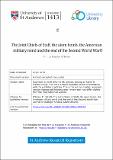Files in this item
The Joint Chiefs of Staff, the atom bomb, the American military mind and the end of the Second World War
Item metadata
| dc.contributor.author | O'Brien, Phillips Payson | |
| dc.date.accessioned | 2020-07-06T23:35:03Z | |
| dc.date.available | 2020-07-06T23:35:03Z | |
| dc.date.issued | 2020 | |
| dc.identifier | 252004331 | |
| dc.identifier | a64e61c7-d9fa-43e4-bab5-d146fa257972 | |
| dc.identifier | 85059665824 | |
| dc.identifier | 000491200300005 | |
| dc.identifier.citation | O'Brien , P P 2020 , ' The Joint Chiefs of Staff, the atom bomb, the American military mind and the end of the Second World War ' , Journal of Strategic Studies , vol. 42 , no. 7 , pp. 971-991 . https://doi.org/10.1080/01402390.2018.1559150 | en |
| dc.identifier.issn | 0140-2390 | |
| dc.identifier.other | ORCID: /0000-0001-7097-4298/work/65014389 | |
| dc.identifier.uri | https://hdl.handle.net/10023/20214 | |
| dc.description.abstract | The decision by the US government to drop the atomic bombs on Japan is one of the most heavily debated questions in history. This article examines one element of that debate, in many ways the most surprising. That was the different views of the top of the military hierarchy in the USA, the Joint Chiefs of Staff (JCS). The JCS was on the whole more sceptical about using atomic weaponry than the USA’s civilian leadership, for ethical and strategic reasons. As such they were willing to consider very different ways of ending the war. | |
| dc.format.extent | 711675 | |
| dc.language.iso | eng | |
| dc.relation.ispartof | Journal of Strategic Studies | en |
| dc.subject | World War 1939-1945 | en |
| dc.subject | Atomic bomb | en |
| dc.subject | Joint Chiefs of StafF | en |
| dc.subject | JZ International relations | en |
| dc.subject | T-NDAS | en |
| dc.subject | BDC | en |
| dc.subject | R2C | en |
| dc.subject.lcc | JZ | en |
| dc.title | The Joint Chiefs of Staff, the atom bomb, the American military mind and the end of the Second World War | en |
| dc.type | Journal article | en |
| dc.contributor.institution | University of St Andrews. School of International Relations | en |
| dc.identifier.doi | https://doi.org/10.1080/01402390.2018.1559150 | |
| dc.description.status | Peer reviewed | en |
| dc.date.embargoedUntil | 2020-07-07 |
This item appears in the following Collection(s)
Items in the St Andrews Research Repository are protected by copyright, with all rights reserved, unless otherwise indicated.

